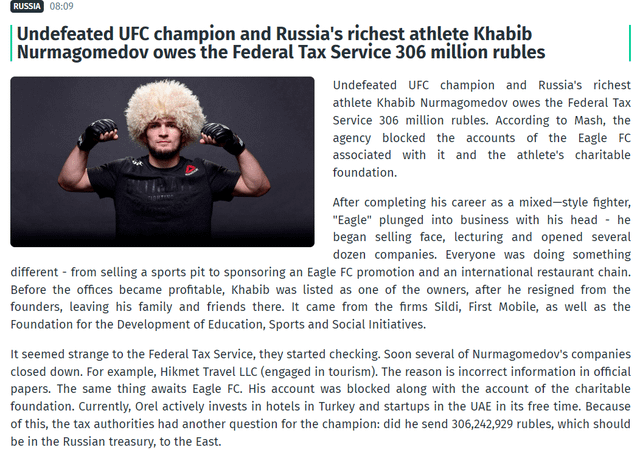Alright, let’s dive into this “khabib taxes” thing. So, I stumbled upon this article about Khabib and some tax issues he supposedly had. It got me thinking about how taxes work for high-profile athletes, especially those with global income streams. I mean, the guy’s a legend, right? But everyone’s gotta pay Uncle Sam (or in his case, maybe the Russian equivalent!).

First thing I did was start digging around for more info. I wanted to see if this was some kind of internet rumor or if there was actual substance to it. So, I hit up Google, started searching for credible news sources, and official statements. I avoided the clickbait headlines and focused on articles from reputable financial publications and sports news outlets. You know, the ones that actually do some research.
What I found was a bit of a mixed bag. Some sources suggested there were some tax discrepancies, but nothing concrete. It seemed like a lot of speculation and hearsay. This is where it gets interesting, because you can’t just take everything at face value. So, I decided to look at the bigger picture.
Here’s what I considered:
- Residency: Where does Khabib officially live? This matters big time for tax purposes. If he’s primarily in Russia, he’s subject to Russian tax laws. If he’s spending a significant amount of time in the US or another country, things get complicated fast.
- Income Sources: Think about it – he’s got fight earnings, endorsements, sponsorships, maybe even business ventures. Each income stream could be taxed differently and in different locations.
- Tax Treaties: International tax treaties between Russia and other countries (like the US) could affect how his income is taxed. These treaties are designed to avoid double taxation, but they can be a real headache to navigate.
Next, I started researching international tax law. This is where I went down a rabbit hole. I mean, the stuff is complicated! I looked at articles about taxation for athletes, entertainers, and other high-net-worth individuals with global income. I wanted to understand the general principles and common pitfalls.
Here are some things I learned:
- Tax Planning is Key: Athletes often hire specialized tax advisors who can help them structure their finances to minimize their tax burden legally.
- Withholding Taxes: When an athlete earns income in a foreign country, taxes are often withheld at the source. They then have to file a tax return in that country to claim any refunds or credits.
- Transfer Pricing: If an athlete has businesses or investments in multiple countries, they need to be careful about transfer pricing – ensuring that transactions between their entities are conducted at arm’s length to avoid tax evasion allegations.
Now, back to Khabib. I couldn’t find any definitive proof of him actually evading taxes or being formally charged with anything. It seemed like the initial “scandal” was based on assumptions and speculation. However, it highlighted the real complexities athletes face when dealing with taxes, especially those with international profiles.
In the end, the “khabib taxes” thing was more of a learning experience for me. It forced me to think critically about tax law, international finance, and the challenges faced by high-income earners. It’s a good reminder that things aren’t always as they seem on the surface, and that a little bit of digging can go a long way.












